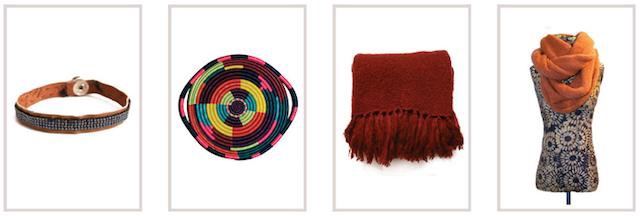From Rwanda to New York to You
by Jia Tolentino
This post is brought to you by UPS. UPS .

The driver of this project was Indego Africa, a nonprofit social enterprise that partners with female artisans in Rwanda to make gorgeous, hand-made, sharply contemporary accessories and home decor. These products are sold on Indego’s online store, as well as through partnerships with designers and retailers like Anthropologie, Madewell, Dannijo, Nicole Miller and Ralph Lauren — and 100% of profits go to training programs for the women in Rwanda.
Indego — which stands for Independence, Development, Governance — was founded in 2007 as a small handicraft organization. “Then,” says creative director Deirdre McGuigan, “we began to see the rise in socially conscious consumerism. We realized that forming partnerships with large brands (Ralph Lauren and Anthropologie were the first) would lead to more consistent income for the women, as well as allow us to scale our business model and impact.”
In the last few years of Indego’s tight, bold growth into a design-driven NGO, the company has continued to expand management, literacy, technology, and health courses for their Rwandan partners. Meticulous annual reports show concrete poverty alleviation: for example, in 2008, 18% of Indego’s partner artisans had a bank account; three years later, the figure had more than quadrupled, to 78%. Only 7% of the partners made more than $1/day in 2008, and today, more than 67% do.
These figures are remarkable, indicating Indego’s understanding of growth and sustainability, the two most elusive unicorns in the world of development. Even as old models of aid are changing, and the most important figure is no longer the amount of money that goes in but — hopefully — the dimensional results that come out, much of development work can seem far too top-down to last. It’s rare to find an organization like Indego Africa: a company that will meet their partners eye-to-eye at a place of great need, then stick with them, building social, political and economic scaffolding, scaling up until each woman achieves financial independence. The company’s self-professed goal is for each Rwandan cooperative to operate in the global retail marketplace independently.
It doesn’t hurt that Indego sells stuff that appeals even without the story: eternity scarves in chartreuse and magenta, thick cowhorn rings wrapped in brilliant, hand-dyed imigwegwe thread, turban headbands, cloth placemats patterned with inky cobalt swallows. I own maybe three pieces of jewelry and I find shopping insanely dull, but still, I found myself loading up a fantasy cart on the Indego website.
Imagining the layers of cross-continental coordination required for an Anthropologie-catalog accessory to make it from Rwanda to the States, I asked Deirdre about the life and times of Indego’s products. “The process of a product coming to market is really collaborative between all parties,” she said. It starts when a designer — whether Deirdre, a third-party collaborator, or an artisan — pitches a product that she thinks will fit both the contemporary fashion market and the skills of the partner artisans. The Indego office in Rwanda then translates and edits the design. Pictures are emailed back and forth, and samples travel halfway around the globe with the production shipments that come to the New York City office every two weeks. (“Shipping to and from Rwanda is super expensive!” Deirdre said. “Occasionally we’ll rush an order for a client, but we try to keep ourselves limited to every two weeks.”)
Once the design is finalized, a cooperative in Rwanda begins to hand-make the products on a larger scale. Eventually, a big box of accessories travels the 7000 miles from Kigali to Manhattan and lands in Deirdre’s office. She keeps a few samples for review, sends product to clients, and packs the rest off to their warehouse, from whence the pretty scarf comes is sent out when ordered.
Shopping is political; the way we use our money is one of the best markers of our social priorities. The same goes for the companies we buy from. Some see a global supply chain and increasingly easy shipping processes as an opportunity to cut corners and move work to cheaper shores. Others see new logistics in terms of the fuller, wildly fertile possibilities they offer in terms of ethics, progress and human connection. Every Indego Africa product comes with a hand-signed tag by the artisan who made it, a high-five shipped across the sea.
Sponsored posts are purely editorial content that we are pleased to have presented by a participating sponsor. Advertisers do not produce the content.
Jia Tolentino lives in Ann Arbor.
Support The Billfold
The Billfold continues to exist thanks to support from our readers. Help us continue to do our work by making a monthly pledge on Patreon or a one-time-only contribution through PayPal.
Comments